Multilingualism in Post-Soviet Countries / / ed. by Aneta Pavlenko.
The dissolution of the USSR has created conditions for a unique sociolinguistic experiment, in which fourteen countries, previously united by the same language and political system, engaged in a nation-building process, creating new linguistic regimes. Two decades later, how did these countries fare...
Saved in:
| Superior document: | Title is part of eBook package: De Gruyter MultiLingual Matters Backlist eBook-Package 2000-2013 |
|---|---|
| MitwirkendeR: | |
| HerausgeberIn: | |
| Place / Publishing House: | Bristol ;, Blue Ridge Summit : : Multilingual Matters, , [2008] ©2008 |
| Year of Publication: | 2008 |
| Language: | English |
| Online Access: | |
| Physical Description: | 1 online resource (256 p.) |
| Tags: |
Add Tag
No Tags, Be the first to tag this record!
|
| Other title: | Frontmatter -- Contents -- Multilingualism in Post-Soviet Countries: Language Revival, Language Removal, and Sociolinguistic Theory -- Language Management and Language Problems in Belarus: Education and Beyond -- A Tense and Shifting Balance: Bilingualism and Education in Ukraine -- Uneasy Compromise: Language and Education in Moldova -- Language and Education Orientations in Lithuania: A Cross-Baltic Perspective Post-EU Accession -- Estonianization Efforts Post-Independence -- Language Policies of Kazakhization and Their Influence on Language Attitudes and Use -- Multilingualism, Russian Language and Education in Kyrgyzstan -- Language and Education Policies in Tajikistan |
|---|---|
| Summary: | The dissolution of the USSR has created conditions for a unique sociolinguistic experiment, in which fourteen countries, previously united by the same language and political system, engaged in a nation-building process, creating new linguistic regimes. Two decades later, how did these countries fare in their struggle to initiate a shift from Russian to the titular languages? Which ones succeeded and which ones restored Russian as an official language? How did they go about articulating the rights of linguistic minorities? Did Russian give way to the new lingua franca, English? This collection offers answers to these and many other questions through detailed analyses of language and education policies and practices in post-Soviet countries. |
| Format: | Mode of access: Internet via World Wide Web. |
| ISBN: | 9781847690883 9783111024738 9783110663136 9783110606713 |
| DOI: | 10.21832/9781847690883 |
| Access: | restricted access |
| Hierarchical level: | Monograph |
| Statement of Responsibility: | ed. by Aneta Pavlenko. |
